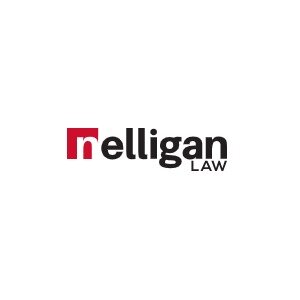Best Sanctions & Export Controls Lawyers in Ottawa
Share your needs with us, get contacted by law firms.
Free. Takes 2 min.
List of the best lawyers in Ottawa, Canada

KENTUADEI ADEFE, FOREIGN LEGAL CONSULTANT ON NIGERIAN LAW
15 minutes Free ConsultationCanada Sanctions & Export Controls Legal Articles
Browse our 2 legal articles about Sanctions & Export Controls in Canada written by expert lawyers.
- How Foreign Subsidiaries in Canada Can Meet 2026 Export Laws
- How Foreign Subsidiaries in Canada Can Comply With 2026 Export Controls Key Takeaways Navigating the 2026 updates to Canadian trade regulations requires foreign subsidiaries to localize their compliance protocols rather than relying entirely on global corporate frameworks. The revised regulatory environment enforces strict localized auditing and screening measures. Distinct Legal... Read more →
- Sanctions Compliance for Canadian Businesses - Trade Risks
- Canadian businesses are subject to strict liability under the Special Economic Measures Act (SEMA) and the Justice for Victims of Corrupt Foreign Officials Act (FAC), meaning intent is often irrelevant to a finding of a violation. All Canadian citizens and businesses, regardless of where they operate in the world, must... Read more →
About Sanctions & Export Controls Law in Ottawa, Canada
Sanctions and export controls are essential components of Canada’s international trade and security framework. In Ottawa, as Canada’s capital and home to many government agencies and embassies, these regulations have particular significance. Sanctions laws restrict dealings with specific countries, entities, or individuals, often as a result of government or United Nations decisions. Export controls govern the transfer and trade of certain goods, services, and technologies that could have military or security applications. These laws are designed to support foreign policy objectives and safeguard national and global security. Businesses, organizations, and individuals dealing with international trade or transactions must comply with these rules to avoid severe penalties.
Why You May Need a Lawyer
There are numerous situations where professional legal guidance in sanctions and export controls can be crucial:
- Navigating complex regulations when exporting goods, software, or technology abroad
- Establishing business partnerships or joint ventures with international entities
- Responding to changes in Canadian or international sanctions affecting existing contracts or supply chains
- Applying for permits or authorizations for controlled goods or services
- Defending against allegations of non-compliance or facing enforcement actions
- Conducting due diligence in mergers, acquisitions, or investments involving foreign stakeholders
- Providing advice on trade with jurisdictions, entities, or individuals subject to Canadian or international sanctions
A lawyer knowledgeable in sanctions and export controls can help identify risks, ensure compliance, and represent your interests in investigations or proceedings. Failing to comply with these regulations may result in hefty fines, criminal charges, loss of export privileges, or reputational harm.
Local Laws Overview
In Ottawa, the legal landscape for sanctions and export controls involves several key federal statutes and regulations, including:
- The Special Economic Measures Act (SEMA) and the United Nations Act, which enable the federal government to impose sanctions in line with Canadian foreign policy or United Nations Security Council resolutions.
- The Export and Import Permits Act (EIPA), which controls the export, import, and brokering of certain goods including military, dual-use, and strategic items. This Act is administered by Global Affairs Canada.
- The Criminal Code and other statutes that create offences for false reporting, smuggling, or evasion of controls.
Ottawa businesses and residents must stay up to date on rapidly evolving lists of sanctioned countries, entities, and products. Non-compliance is strictly enforced by agencies like the Canada Border Services Agency (CBSA) and the Royal Canadian Mounted Police (RCMP), often in coordination with Global Affairs Canada.
Frequently Asked Questions
What are sanctions and how do they apply in Ottawa?
Sanctions are government-imposed restrictions on certain types of trade or financial dealings with specified countries, entities, or individuals. In Ottawa, these apply to people and businesses engaged in international transactions, and compliance is mandatory under federal law.
Who administers export controls and sanctions in Canada?
Global Affairs Canada administers most export controls and sanctions. The Canada Border Services Agency and RCMP enforce these laws. Other agencies may be involved depending on the nature of the goods or services.
What types of goods are subject to export controls?
Export controls often apply to military goods, dual-use technologies, nuclear materials, cryptographic software, and sensitive biotechnology items.
Are all international transactions covered by sanctions and export controls?
No, but you must check whether your transaction involves a sanctioned country, person, or controlled goods or technology. The lists of restricted persons and items are publicly available from Global Affairs Canada.
Do I need a permit to export controlled goods?
Yes, most controlled goods require an export permit from Global Affairs Canada. Attempting to export such goods without authorization is illegal and may trigger enforcement actions.
How do I know if a country or individual is subject to Canadian sanctions?
Global Affairs Canada maintains updated lists of sanctioned countries and individuals. Reviewing these resources or working with a lawyer can help ensure your transactions are compliant.
What are the penalties for violating sanctions or export control laws?
Penalties can include substantial fines, imprisonment, seizure of goods, loss of export privileges, and negative publicity. Even unintentional violations can result in enforcement action.
Are there exemptions to sanctions or export controls?
Some exemptions may apply, such as for humanitarian goods. Obtaining legal advice is important to determine whether an exemption applies and what steps are required to claim it.
How often do sanctions and export control regulations change?
Regulations and sanctioned persons or entities lists may change frequently, often in response to international developments. It is important for businesses to monitor updates regularly or consult a lawyer.
Can individuals be liable for export control or sanctions violations?
Yes, individuals as well as companies can be prosecuted for violations. Everyone involved in a transaction can potentially be held accountable for compliance breaches.
Additional Resources
If you have questions or need up-to-date information on sanctions and export controls, the following organizations and agencies can be helpful:
- Global Affairs Canada - Responsible for export permits, sanctions lists, and policy guidance.
- Canada Border Services Agency - Enforces export and import restrictions at Canadian borders.
- Royal Canadian Mounted Police - Investigates major violations relating to sanctions and export controls.
- Canadian Association of Importers and Exporters - Non-governmental resource providing information and training.
- Ottawa Board of Trade - Useful for local business networking and compliance resources.
- Local law firms specializing in international trade and regulatory law - Offer tailored legal advice and representation.
Next Steps
If you believe you require legal assistance with a sanctions or export controls issue in Ottawa, here are some recommended next steps:
- Identify the specific goods, transactions, or entities involved in your matter.
- Review current Canadian sanctions and export control lists and see if your transaction is affected.
- Document all correspondence, contracts, and communications related to any at-risk export or international deal.
- Reach out to an Ottawa-based lawyer who specializes in sanctions and export controls for a consultation.
- Stay informed about changes in regulations by subscribing to updates from Global Affairs Canada or reputable trade organizations.
Working with a knowledgeable legal professional can help you navigate the complexities of sanctions and export controls law, reduce your legal risks, and ensure your business or personal activities are fully compliant.
Lawzana helps you find the best lawyers and law firms in Ottawa through a curated and pre-screened list of qualified legal professionals. Our platform offers rankings and detailed profiles of attorneys and law firms, allowing you to compare based on practice areas, including Sanctions & Export Controls, experience, and client feedback.
Each profile includes a description of the firm's areas of practice, client reviews, team members and partners, year of establishment, spoken languages, office locations, contact information, social media presence, and any published articles or resources. Most firms on our platform speak English and are experienced in both local and international legal matters.
Get a quote from top-rated law firms in Ottawa, Canada — quickly, securely, and without unnecessary hassle.
Disclaimer:
The information provided on this page is for general informational purposes only and does not constitute legal advice. While we strive to ensure the accuracy and relevance of the content, legal information may change over time, and interpretations of the law can vary. You should always consult with a qualified legal professional for advice specific to your situation.
We disclaim all liability for actions taken or not taken based on the content of this page. If you believe any information is incorrect or outdated, please contact us, and we will review and update it where appropriate.








